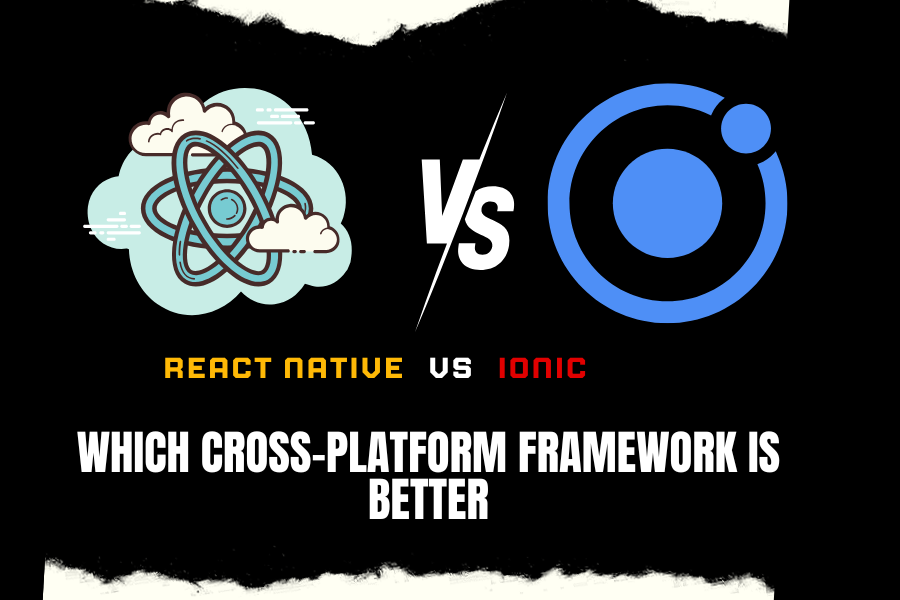- May 8, 2025
- by devstree
- Mobile Application
- 391 Views
- 0 Comments
Cross-platform mobile app development allows businesses to target both iOS and Android with a single codebase, saving time and resources. Two leading frameworks, Ionic and React Native, are popular choices for building cross-platform apps. But which one suits your project best? In this blog, we’ll compare Ionic and React Native across key factors to help you decide.
Overview of Ionic and React Native
Ionic is a hybrid app development framework that uses web technologies like HTML, CSS, and JavaScript. It leverages tools like Capacitor or Cordova to access native device features and runs apps in a WebView, making it accessible for web developers.
React Native, developed by Facebook, is a JavaScript-based framework that uses React to build apps with native components. It delivers a near-native experience and is used by companies like Walmart and Bloomberg.
Comparing Ionic and React Native
Let’s dive into how these frameworks stack up in terms of performance, development experience, and more.
Performance
React Native: By rendering native components, React Native offers superior performance, especially for apps requiring smooth animations or heavy computations. Its JavaScript bridge enables efficient communication with native code.
Ionic: Ionic apps run in a WebView, which can result in slower performance for complex apps. While Capacitor has improved native access, Ionic still lags behind React Native for resource-intensive applications.
Winner: React Native, for better performance and native-like responsiveness.
User Experience and UI
React Native: Provides native UI components, ensuring apps closely mimic the look and feel of platform-specific designs. Developers can fine-tune UI for each platform if needed.
Ionic: Uses web-based components styled to resemble native ones. While Ionic’s UI library is robust, it may not fully replicate the native experience, especially for intricate designs.
Winner: React Native, for more authentic native UI.
Development Experience
Ionic: Built for web developers, Ionic’s use of familiar web technologies lowers the learning curve. Its extensive component library and plugins accelerate development for simpler apps.
React Native: Requires knowledge of React and some native development for custom features. While powerful, it may take longer for teams without React experience to get up to speed.
Winner: Ionic, for faster development and web developer accessibility.
Ecosystem and Community Support
React Native: Boasts a large, active community and a vast ecosystem of libraries and tools. Its popularity ensures frequent updates and extensive third-party support.
Ionic: Has a solid community and a marketplace for plugins, but its ecosystem is smaller than React Native’s, which can limit options for advanced features.
Winner: React Native, for its broader ecosystem and support.
Native Feature Access
React Native: Offers direct access to native APIs through JavaScript, with a wide range of community-driven modules for features like camera, GPS, or notifications.
Ionic: Relies on Capacitor or Cordova plugins to access native features. While effective for common use cases, complex integrations may require additional effort.
Winner: React Native, for smoother and more flexible native access.
Cost and Development Time
Ionic: Typically reduces development costs due to its web-based approach and faster prototyping. It’s ideal for projects with limited budgets or tight deadlines.
React Native: May involve higher costs due to the need for React expertise and potential platform-specific adjustments, but it saves time for complex apps in the long run.
Winner: Ionic, for lower initial costs and quicker development.
When to Choose Ionic or React Native?
Choose Ionic if:
- Your team has web development expertise (HTML, CSS, JavaScript).
- You’re building a simple app or need a quick prototype.
- Budget constraints are a priority.
Choose React Native if:
- You need a high-performance app with a native look and feel.
- Your app requires complex features or heavy native integrations.
- Your team is familiar with React and can handle native development tasks.
Conclusion
Both Ionic and React Native are powerful frameworks for cross-platform app development, but their strengths cater to different needs. Ionic is perfect for rapid development and web developers, while React Native excels in delivering high-performance, native-like apps. Evaluate your project’s requirements, team skills, and budget to make an informed choice.
Need help deciding or building your app? Contact us for expert guidance!

